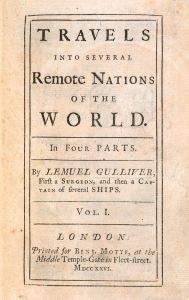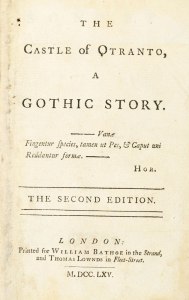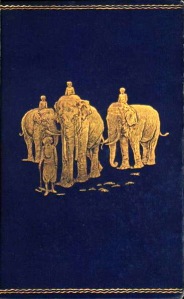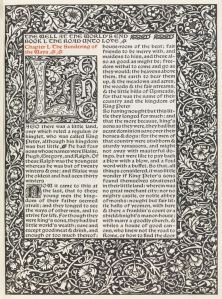The word “fantasy” wasn’t used to describe a literary genre until the mid 20th Century, when fantasy books were distinguished from other kinds (particularly from children’s literature) and gained popularity. However, many novels of the 18th and 19th Centuries had all the hallmarks of what we’d now call fantasy, or influenced later fantasy writers.
Below I’ve listed what I believe to be the 12 most significant of these works published before 1900. I’ve tried to use their original covers, or failing that, their title pages:
(To enlarge a cover simply click on it and the image gallery will open)
- Le Morte D’Arthur, Thomas Malory, 1485
- Gulliver’s Travels, Jonathan Swift, 1726
- The Castle of Otranto, Horace Walpole, 1764
- The Vampyre, John William Polidori, 1819
- A Christmas Carol, Charles Dickens, 1843
- Alice’s Adventures in Wonderland, Lewis Carroll, 1865
- The Princess and the Goblin, George MacDonald, 1872
- She: A History of Adventure, H. Rider Haggard, 1887
- A Connecticut Yankee in King Arthur’s Court, Mark Twain, 1889
- The Jungle Book, Rudyard Kipling, 1894
- The Well at the World’s End, William Morris, 1896
-
Dracula, Bram Stoker,
1897
Some of these books are now widely accepted as originators or important early examples of related genres and sub-genres – e.g. Le Morte d’Arthur for Arthurian Fantasy, She: A History of Adventure and other works by H. Rider Haggard for the Lost World sub-genre (a genre that often blurs the lines between fantasy and science fiction), The Vampyre for Vampire Fiction, The Castle of Otranto for Gothic fiction, and A Connecticut Yankee in King Arthur’s Court for Time Travel Fantasy.
Gothic and horror fiction thrived in the 1800s, and had a strong influence on fantasy, particularly paranormal and urban fantasy. In fact, the genres are so intertwined it’s difficult to divide the two.
Science Fiction also has its early roots in the 19th Century. While not included above, I’ve mentioned some key science fiction works below that undoubtedly played a role in the rise of speculative fiction as a whole.
A Few Interesting Facts
- There were so many ‘Alice copies’ (books heavily inspired by or based on Alice in Wonderland and Through the Looking Glass – e.g. Alice in Blunderland) in the years following the publication of his famous work that Carroll even started his own collection of them.
- George MacDonald was a mentor to Lewis Carroll and encouraged him to publish Alice in Wonderland.
- Both C.S. Lewis and J.R.R. Tolkien cite George MacDonald as an inspiration.
- Thomas Malory wrote Le Morte d’Arthur while in prison.
- Charles Dickens and Edgar Allan Poe met, and Dickens’s pet raven is said to have inspired Poe’s famous poem “The Raven”.
Other 19th Century Works and Authors
There are some works that didn’t make it into the list above for various reasons (either because they were more works of science fiction, adventure novels or short fairy tales than fantasy, or were an assortment of short stories, or simply weren’t as prominent as others), that are none-the-less worth mentioning too:
- Frankenstein by Mary Shelley (1818)
- The Voyages Extraordinaires novels by Jules Verne (1863 -1905)
- The works of Edgar Allan Poe (1809-1949)
- The works of H.G. Wells (1866-1946)
- The works of Frank R. Stockton (1834-1902)
- Phantasmion by Sara Coleridge (1837)
- Phantastes by George MacDonald (1858) [this vied with The Princess and the Goblin for a place in the above list]
- Erewhon by Samuel Butler (1872)
- The Adventures of Pinocchio by Carlo Collodi (1883)
- King Solomon’s Mines by H. Rider Haggard (1885) [his more famous work, but I included She instead as it has more overtly fantasy elements]
- The Picture of Dorian Gray by Oscar Wilde (1890)
- A Houseboat on the Styx by John Kendrick Bangs (1895) [inspirer of the Bangsian fantasy sub-genre]
- The Treasure Seekers by E. Nesbit (1899)
- Collectors and writers of fairy tales such as Andrew Lang, Charles Perrault, the Brothers Grimm and Hans Christian Andersen.
___________________
Are any of these books a favourite? Or do you think I’ve overlooked an important novel? Feel free to give it a mention in the comments.
Popular 1900s, 10s and 20s Fantasy Novels >
< The Most Influential Fantasy Books of Each Decade (Main Post)













Love this list, saved!
LikeLiked by 1 person
Loving this post! And thanks for the facts too.
Am currently rereading Dracula (I don’t recall much from my first read). I read She couple years ago and hated it. Written well, hated the ideas/opinions of the characters.
LikeLiked by 2 people
Thanks! I hope you’re enjoying Dracula. I read it a few years ago and liked finally getting to know the original story. I haven’t read She but I did see mixed reviews and heard that it expresses very colonialist Victorian ideas and also divides people over its portrayal of women. Sounds like one of those books that was popular at the time and a forerunner of its sub-genre, but doesn’t age well in many respects.
LikeLike
So far, Dracula is pretty good. I like the gothic atmosphere, but it’s not as intensely suspenseful as I thought it would be, or maybe it will become so later.
You’re right about She – very colonialist Victorian ideas that pissed me off as I read, but the book is well written.
LikeLiked by 1 person
I remember taking a course in fantasy literature in college and it was really interesting to see the natural progression. The two early titles my author cited were Treasure Island and Tarzan of the Apes, and Treasure Island was particularly interesting to me. On the surface nothing about the story is “impossible” or even “improbable”, and yet it does fit the fantasy genre rather well, the strange “other place” within which normal rules are suspended, and characters change to become “more” than they were in the “ordinary world”.
LikeLiked by 1 person
Sounds like great college course! I actually um-ed and ah-ed about whether to include Tarzan and Treasure Island because of the lack of that overtly “impossible” element and their reputation as adventure novels. In the end I chose other books (though I think I’ll include Burroughs’s Barsoom series for a later decade) but you’re right, they do fit well and have a fantasy feel, even if the “other place” they enter isn’t expressly magical or a new world.
And now you mention it I should at least have put Treasure Island in the mentions at the bottom of this post, since it was so popular and influenced so many later writers. Oh well, maybe I can add it in late with a reference to your comment 🙂
LikeLiked by 1 person
It is interesting how authors gradually grew more comfortable with “the impossible” over time. They needed a story about a boy living and communicating with animals before they could conceive of animals that could communicare with any human.
LikeLiked by 1 person
So true! I notice many early authors also frame “the impossible” in their stories as potentially a dream or the product of a child’s active imagination – which also suggests they weren’t yet completely comfortable presenting it as a real element.
LikeLiked by 2 people
Mmm. It’s definitely interesting how you can see specific authors almost “teach others” through their example.
LikeLiked by 1 person
Really interesting post, well done. Love the Alice books, H G Wells, Mary Shelley and E Nesbit.
LikeLiked by 1 person
Believe it or not I’ve never read anything by E Nesbit, though I’ve heard a lot about her books. I will have to change that!
LikeLiked by 1 person
I like Five Children and It and the sequel The Phoenix and the Carpet. If you read them, bear in mind they seem a bit dated and slightly prejudiced in depictions of other races but no more than was usual for the time 🙂
LikeLiked by 1 person
Okay that’s good to know – I’ll check them out. In fact Five Children and It and is one I’m considering including for one of the next decades, since it’s written later and is her most popular ‘fantasy’ work (from what I’ve read, her other popular works lack fantasy elements).
LikeLiked by 1 person
Five Children and It is good – a grumpy sand fairy who grants wishes in a very literal way 🙂
LikeLiked by 1 person
A Connecticut Yankee in King Arthur’s Court was one of my first introductions to fantasy. I ADORE it. Great addition! I love so many of these authors.
I consider mythology key to influencing fantasy as a genre. So, Beowulf, Illiad, and Odyssey would be on my own personal list. But I can understand why they wouldn’t be included. Afterall, they all influenced the Bard and wonderful plays such as A Midsummer Night’s Dream.
Pre-1900 there seems to be a much finer line between science fiction and fantasy. I keep coming up with books and then thinking, “Oh, wait. That’s probably science fiction…” XD Such as Tarzan.
LikeLiked by 2 people
Connecticut Yankee is very high to my to-read list but I haven’t read it yet – I’m really glad to hear you loved it though since it gives me extra motivation to finally get to it!
Yes, mythology is definitely a key influence on fantasy, esp. those three you mentioned (only not included here due to categorisation and space reasons). I hadn’t thought of A Midsummer Night’s Dream but true, it has myth and fantasy elements too.
I had the same problem of that finer line – I really struggled with what to include/exclude for this era (and actually the next few decades are proving tricky too). So many things have a fantasy-ish feel, or influenced fantasy, but aren’t quite fantasy.
LikeLiked by 1 person
It’s interesting how from 100,000 feet Fantasy and Science Fiction are completely different. But once you get up closer the lines blur more than one ever thought possible…
I wish you luck with your other era lists! I look forward to reading them and expanding my TBR to a dangerous capacity.
LikeLiked by 1 person
I read Twain’s Connecticut Yankee 35 years ago, and am still laughing at the recollection of select scenes, of which there are many. Beowulf was a much later discovery, fondly enjoyed once I’d found a reasonably early translation to keep it in the ‘old books’ department; and, being contrastingly grim, I didn’t laugh, lol.
Your point about the finer lining prior to 1900 is something I’ll be paying more attention to now: I’d generally approached books from that era with the hopes for an Adventure Story, a lot of which just happened to have fantastic elements (as Verne).
LikeLiked by 2 people
Oooh, I’ve only read a more modern translation of Beowulf. I feel like if I read an older translation I might need a secondary translater! XD Or, perhaps hearing it read aloud will help me understand it? Either way- I should try it for sure. Thanks for getting that in my brain. 🙂
That’s a good approach to genre pre-1900. Adventure Story could be science fiction or fantasy. I do love me some Jules Verne…
LikeLiked by 2 people
I was actually part of a Beowulf reading group for a while at university where we read the original Anglo-Saxon version aloud next to a literal translation. Several people in the group were specialised in old languages and brought along pronunciation guides (I would have had no idea how to read it otherwise!). It was a slow process, but incredibly fascinating to get a sense of the original language and finer meanings… though I’m really glad I read a non-literal translation beforehand to get a sense of the overall story, otherwise I think I would have been very confused!
LikeLiked by 2 people
This reminds me of how I recommend people either read Les Miserables or become familiar with the soundtrack before seeing the musical. It happens so quickly, so much happens at once, and often French accents are used, which makes it a challenging musical to observe with no background first. It would be so cool to hear Beowulf in the original Anglo-Saxon version! Plus, comparing it to a literal translation– then you could understand the beauty of the original words together while understanding the text. How cool!
LikeLiked by 1 person
What!, you don’t have an original cover for Le Morte D’Arthur? :p (Can the British Museum even come up with an original cover?)
I think Scheherazade, that rather prolific storyteller, can figure in here, somewhere. When I bought a 20 volume edition of Burton’s translation, I was interested to note that the 1,001 Nights took up only the first 9 volumes; meaning there are more supplemental stories than not. A side note to this, is that out here on the west coast I could never find a complete set of the Nights in any used bookstore, not for love or money. In subsequent years, I did a lot of mail order from a rare book dealer out of Ohio. After a few years of regular purchasing, a complete edition showed up. Securing it right quick, I mentioned to the dealer my dismay at spending decades searching, never to have found a set. He replied that in earlier days people moving out west, whether by covered wagon or motor, were probably not prioritizing the inclusion of a heavy set of 20 books in such a long distance move.
George MacDonald was in my reading radar for a long time. Finally, as an adult, I picked up The Princess and the Goblin, and loved it, not at all too ‘kiddie’ for adults to sink their reading teeth into. His much earlier Phantastes came next, an essential in fantasy history (written in 1857); and though steeped in the world of Faerie, with happy inclusion of monsters and assorted other fantastical beings, I think he was just finding his auctorial sea legs, so I can’t hold it aloft as I do Eddison’s Worm Ouroboros, Peake’s Titus Groan, or Tolkien’s massive saga. However, I just started MacDonald’s decades-later Lilith, and it’s immediately clear he improved as a writer: the syntax is adept; and he doesn’t interrupt with endless pages of poetry and song. (I’m hoping, too, there won’t be infinite instances of men weeping — a story’s spoliation, yes; a spoiler, no. 🙂 )
Thank you, Nicola, for sharing your thoughts on the fantastic; and for recognizing the too-oft neglected Frank R. Stockton.
LikeLiked by 1 person
Haha, believe it or not I did actually try to find an original cover! And I ended up on the British Library online collection but they only had the original (pre-publication) manuscript which, needless to say, did not have anything in the way of a cover or title page 🙂
1001 Nights is a great one to mention. From what I understand (though my memory is vague since it’s been a while since I read about it) there’s still a bit of uncertainty about who the original authors/sources of all the works that were translated were, and about how much was added by the translator or from other sources. I guess since a lot of it is ancient fairytales / oral tales it’s hard to pin down ‘original authors’. Amazing you managed to get a complete 20-volume edition of Burton’s translation – that would be a wonderful thing to have!
I’ve been planning to read both The Princess and the Goblin and Phantastes – but I hadn’t considered Lilith. Interesting that you say MacDonald improves as an writer with the later books. I’m curious to read his work, but I think I’ll be reading Titus Groan and Worm Ouroboros first.
Great you liked the post!
LikeLiked by 1 person
I love “Alice in Wonderland”, “Gullivers Travels”, and “Dracula”. While I haven’t read “Princess and the Goblin”, I do have a copy of George Macdonald’s “Phantastes”, which I really like.
LikeLiked by 2 people
great postn
LikeLike
Two suggestions: Sir Gawain and the Green Knight, and Edward Bellamy’s Looking Backward, 1888. Gawain is a gorgeous Middle English alliterative romance in a thorny northern dialect. Fortunately there are a couple of modern “translations” (one of them my own). Looking Backward is a Utopian vision of an ideal future–something like William Morris’ News from Nowhere–that John Dewey considered the most influential work written by an American in the (then) last fifty years. Two great reads.
LikeLiked by 1 person
Great suggestions – I’ve heard of Sir Gawain and the Green Knight before (though have never read it) but for some reason Bellamy’s ‘Looking Backward’ wasn’t on my radar at all. It sounds very influential and intriguing, and from looking it up I see it was also a best-seller in its time. Thanks for drawing my attention to these!
LikeLike
Love that you did this post on books that would be considered fantasy by today’s standard- even though they aren’t technically defined that way. I often think of gothic books in particular, like Dracula, as precursors to fantasy books of today (especially with regards to people who view fantasy books, including classics like LOTR, as not worthy of being in the canon).
LikeLiked by 1 person
Yes it proved a bit challenging for that reason – none of them were neatly labelled ‘fantasy’ (and many were more precursors as you say) so I had to retrospectively apply my current standards and hope for the best 🙂 I also find it interesting that today’s ‘paranormal’ books are now considered more fantasy than horror, but they actually often owe a lot more to those early gothic and horror books.
Amazing that people can dismiss LOTR as not worthy of being canon!! But some people do have a prejudice where fantasy is concerned. Makes me glad to put the spotlight on some fantasy classics 🙂
LikeLiked by 1 person
It really worked 🙂 Yeah that’s very interesting.
I know! It’s crazy, but they do!! They do unfortunately Absolutely 😀
Absolutely 😀
LikeLiked by 1 person
Pingback: Mythical, Mystical, Magical Reading Challenge 2021 (being edited) – Juulna’s 2021 Reading Challenges